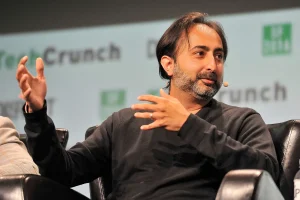Sam Altman opposes government bailout for OpenAI in case of failure.

Image Credits:Getty Images under a GEN AI Base20K license.
OpenAI Faces Funding Challenges Amid Ambitious Expansion Plans
OpenAI executives recently encountered a wave of inquiries about their strategy to finance an unprecedented $1.4 trillion in data center development and operational commitments for this year. According to CEO Sam Altman, even with a rapidly increasing revenue pace, the company is currently operating on a $20 billion annual run rate.
CFO’s Controversial Comments on Government Support
These discussions were ignited by remarks from OpenAI’s Chief Financial Officer, Sarah Friar, during a Wall Street Journal event. She proposed the idea of the U.S. government “backstopping” the company’s infrastructure loans. This would theoretically lower the cost of loans, enabling OpenAI to consistently utilize the latest technology—specifically, advanced chips crucial for their operations.
A backstopped loan, essentially a government guarantee, mitigates risk for lenders. If OpenAI were to default on their loans, taxpayers would shoulder the financial burden, leading to favorable loan terms. While Friar acknowledged the affordability of financing options utilizing older chip technology, she emphasized the company’s intent to deploy cutting-edge models on the latest chips.
Seeking a Diverse Ecosystem for Funding
To facilitate the ongoing need for advanced chips, Friar discussed the necessity of building an “ecosystem” involving partnerships with banks, private equity firms, and, ideally, government support. She noted, “The backstop, the guarantee that allows financing to happen, can notably reduce financing costs and increase the loan-to-value ratio, enabling us to take on more debt alongside equity.”
Further hinting at negotiations with government entities, she expressed optimism, stating that the U.S. government is increasingly recognizing AI as a strategic national asset.
Immediate Backtrack on Government Support
However, after the clip of her comments circulated, prompting backlash from various stakeholders online, Friar quickly clarified her position. She took to LinkedIn to state, “OpenAI is not seeking a government backstop for our infrastructure commitments. I used the word ‘backstop,’ and it muddied the point.”
No Plans for Federal Bailouts
Following Friar’s remarks, David Sacks, an advisor on AI to Trump and a prominent venture capitalist in Silicon Valley, weighed in on the situation. He reaffirmed that the U.S. has no plans for a federal bailout of AI companies, emphasizing that if one of the five leading AI companies fails, others would continue the industry’s trajectory. Sacks also suggested that the government’s focus should be on simplifying permitting and power generation processes rather than providing financial backstops.
Altman’s Stance Against Government Guarantees
In light of these events, Altman echoed Sacks’ sentiments via a comprehensive post on X. He stated unequivocally, “We do not have or want government guarantees for OpenAI data centers. Governments should not pick winners or losers, and taxpayers should not finance companies that make poor business decisions.”
He did note that discussions around potential loan guarantees exist, but they primarily pertain to supporting semiconductor manufacturing facilities in the U.S. Altman reassured stakeholders that OpenAI had not formally applied for these guarantees.
The Real Challenges Ahead
Despite the controversy surrounding Friar’s initial comments, the underlying issue remains: how will OpenAI fund its ambitious $1.4 trillion expansion? With fierce public skepticism about the viability of government intervention, OpenAI leaders are on the defensive and prepared for further questions.
Altman appears ready to tackle these challenges head-on. He stated, “We anticipate ending the year with more than $20 billion in annualized revenue and aspire to reach hundreds of billions by 2030. We are looking at commitments of approximately $1.4 trillion over the next eight years.” He remains optimistic about OpenAI’s future prospects, particularly in its enterprise offerings, the introduction of new consumer devices, and advancements in robotics.
The Future of AI Financing
As the dialogue surrounding the funding of groundbreaking AI technology continues, OpenAI finds itself navigating uncharted waters. The discussions around potential government support highlight an essential question about responsibility in innovation. Should taxpayers be implicated in financing private enterprises, especially in an industry as volatile as AI?
Moving forward, it’s evident that OpenAI will need to craft a multifaceted financing strategy involving a diverse array of partners. As they push toward ambitious growth targets, the company will likely maintain its commitment to innovation and responsible management, all while heeding the feedback and concerns voiced by the public and financial stakeholders alike.
In conclusion, OpenAI’s quest for the necessary funds to achieve its lofty ambitions is a topic that deserves continued public and academic scrutiny. As AI continues to transform industries worldwide, the fiscal landscape that supports this transformation will need to evolve as well. The dialogue between private firms, government entities, and the public will play a significant role in shaping the future of artificial intelligence and its societal impacts.
Thanks for reading. Please let us know your thoughts and ideas in the comment section down below.
Source link
#Sam #Altman #doesnt #government #bail #OpenAI #fails





